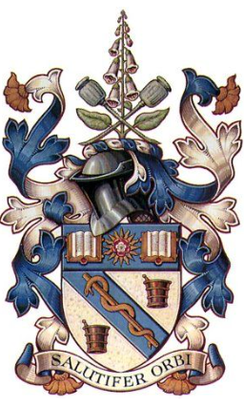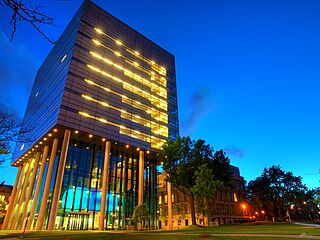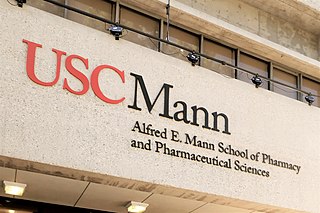
A pharmacist, also known as a chemist in Commonwealth English, is a healthcare professional who specializes in the preparation, dispensing, and management of medications. A pharmacist provides pharmaceutical advice and guidance, often serving as a primary care provider in the community, and offering other services, such as health screenings and immunizations.

The UCL School of Pharmacy is the pharmacy school of University College London (UCL). The School forms part of UCL's Faculty of Life Sciences and is located in London, United Kingdom.
A Doctor of Pharmacy is a professional doctorate degree. In some countries, it is a proficient graduate degree to practice the profession of pharmacy or to become a clinical pharmacist. In many countries, people with their Doctor of Pharmacy are allowed to practice independently and can prescribe over-the-counter drugs directly to patients that doesn't require prescription in other countries. A PharmD program has significant experiential and/or clinical education components in introductory and advanced levels for the safe and effective use of drugs. Experiential education prepares graduates to be practice-ready, as they already have spent a significant amount of time training in areas of direct patient care and research.

Hamdard University is a private research university with campuses in Karachi and Islamabad, Pakistan. It was founded in 1991 by the philanthropist Hakim Said of the Hamdard Foundation. It is one of the first and oldest private institutions of higher education in Pakistan, and also is the largest private research university in Karachi, with an campus area of over 350 acres.

Jamia Hamdard is an institute of higher education deemed to be university located in New Delhi, India. Established in 1989, it is a government-funded university and was formally inaugurated by then Indian prime minister Rajiv Gandhi. In 2019, it was awarded Institute of Eminence status by Ministry of Human Resource Development.
The Master of Pharmacy is a postgraduate degree in pharmacy, awarded upon the completion of postgraduate coursework or an integrated undergraduate-postgraduate curriculum. Typically, this program lasts for four to five years.
The Medway School of Pharmacy is a school of pharmacy in South East England. Established in 2004, the school is the result of a collaboration between the University of Greenwich and the University of Kent. Its campus is part of a shared facility on Chatham Dockyard in Medway, Kent.

The Campbell University College of Pharmacy & Health Sciences is an American pharmacy school founded in 1985 by Dean Ronald Maddox and located in Buies Creek, North Carolina. The College is one of seven schools that compose Campbell University. In 2009, the school's name was changed to Campbell University College of Pharmacy and Health Sciences.
Sefako Makgatho Health Sciences University is a medical university in Ga-Rankuwa, Gauteng Province, South Africa. Its current incarnation was formed on 1 January 2015. Previously, it was known as Medical University of South Africa (MEDUNSA) and later as MEDUNSA campus of the University of Limpopo. It is named after South African ANC leader Sefako Makgatho.
The basic requirement for pharmacists to be considered for registration is often an undergraduate or postgraduate pharmacy degree from a recognized university. In many countries, this involves a four- or five-year course to attain a bachelor of pharmacy or master of pharmacy degree.
The University of Pharmacy, Yangon, located in North Okkalapa, Yangon, is one of two pharmacy schools in Myanmar. The university offers Bachelor of Pharmacy (BPharm) and Master of Pharmacy (MPharm)and phD degree programs. The university accepts approximately 150 students annually based solely on their University Entrance Examination scores.

The Leslie Dan Faculty of Pharmacy is a pharmacy school and an academic division of the University of Toronto. The school is located on the northwestern corner of College Street and University Avenue, placing it across from the Ontario Legislative Building and at the entrance to Queen's Park station. It is also situated near four internationally renowned hospitals—The Hospital for Sick Children, Princess Margaret Cancer Centre, Toronto General Hospital and Mount Sinai Hospital. It is part of Toronto's Discovery District.
Makerere University College of Health Sciences (MakCHS), is one of the 10 colleges that constitute Makerere University, East Africa,s oldest university. The college was established in 2007 by consolidating the training offered by the University in the disciplines of Medicine, Dentistry, Pharmacy, Nursing, Public Health, Optometry, Radiography and other health sciences. The college of Health Sciences consists of 5 schools: School of Medicine, School of Public Health, School of Biomedical Sciences, School of Dentistry and School og Health Sciences. The college provides training in the health sciences at the undergraduate, masters, PhD and post- doctoral levels levels.
The University of Alberta Faculty of Pharmacy and Pharmaceutical Sciences, is located in Edmonton, Alberta, Canada. It offers undergraduate and graduate degrees in pharmacy.

The University of Health Sciences is a public university offering degrees in health sciences in Phnom Penh, Cambodia.

Kanak Manjari Institute of Pharmaceutical Sciences, also known as KMIPS, is a well-known pharmaceutical sciences institute in the Indian State of Odisha. It was established in 1982 in Chhend Colony, Rourkela to teach Pharmaceutical Sciences and to award diplomas as well as undergraduate and postgraduate degrees to students around the state.
Harare Institute of Technology (HIT) is a Zimbabwean university offering courses mainly in technology.

The USC Alfred E. Mann School of Pharmacy and Pharmaceutical Sciences is the pharmacy school of the University of Southern California, originally established in 1905 as USC College of Pharmacy. On November 17, 2022, the University of Southern California released an announcement stating that the school will be renamed the USC Alfred E. Mann School of Pharmacy and Pharmaceutical Sciences and will receive a $50 million endowment for student scholarships, faculty recruitment and integrating a university-wide research infrastructure related to biomedical innovation across USC’s University Park and Health Sciences campuses. The School is led by Dean Vassilios Papadopoulos.
Part of the University of Otago's Division of Health Sciences, the School of Pharmacy is based in Dunedin, New Zealand. It is ranked in the world's top-200 universities for pharmacy and pharmacology.
The Maharashtra State Pharmacy Council (MSPC) is the statutory body under Ministry of Medical Education, Government of Maharashtra. It is constituted under the Pharmacy Act, 1948. Maharashtra State Pharmacy Council regulates the profession of pharmacy in Maharashtra.








